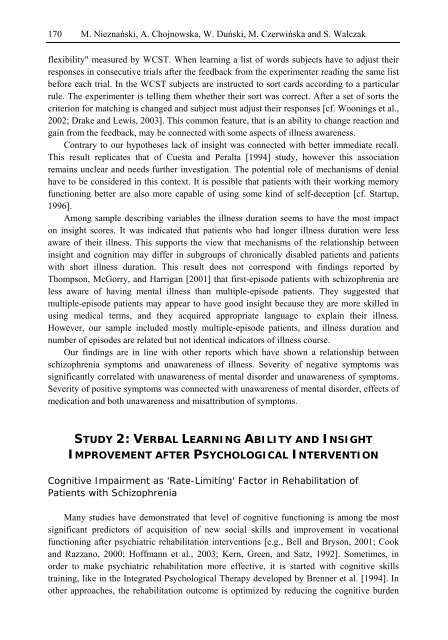Schizophrenia Research Trends
Schizophrenia Research Trends
Schizophrenia Research Trends
- No tags were found...
Create successful ePaper yourself
Turn your PDF publications into a flip-book with our unique Google optimized e-Paper software.
170M. Nieznański, A. Chojnowska, W. Duński, M. Czerwińska and S. Walczakflexibility" measured by WCST. When learning a list of words subjects have to adjust theirresponses in consecutive trials after the feedback from the experimenter reading the same listbefore each trial. In the WCST subjects are instructed to sort cards according to a particularrule. The experimenter is telling them whether their sort was correct. After a set of sorts thecriterion for matching is changed and subject must adjust their responses [cf. Woonings et al.,2002; Drake and Lewis, 2003]. This common feature, that is an ability to change reaction andgain from the feedback, may be connected with some aspects of illness awareness.Contrary to our hypotheses lack of insight was connected with better immediate recall.This result replicates that of Cuesta and Peralta [1994] study, however this associationremains unclear and needs further investigation. The potential role of mechanisms of denialhave to be considered in this context. It is possible that patients with their working memoryfunctioning better are also more capable of using some kind of self-deception [cf. Startup,1996].Among sample describing variables the illness duration seems to have the most impacton insight scores. It was indicated that patients who had longer illness duration were lessaware of their illness. This supports the view that mechanisms of the relationship betweeninsight and cognition may differ in subgroups of chronically disabled patients and patientswith short illness duration. This result does not correspond with findings reported byThompson, McGorry, and Harrigan [2001] that first-episode patients with schizophrenia areless aware of having mental illness than multiple-episode patients. They suggested thatmultiple-episode patients may appear to have good insight because they are more skilled inusing medical terms, and they acquired appropriate language to explain their illness.However, our sample included mostly multiple-episode patients, and illness duration andnumber of episodes are related but not identical indicators of illness course.Our findings are in line with other reports which have shown a relationship betweenschizophrenia symptoms and unawareness of illness. Severity of negative symptoms wassignificantly correlated with unawareness of mental disorder and unawareness of symptoms.Severity of positive symptoms was connected with unawareness of mental disorder, effects ofmedication and both unawareness and misattribution of symptoms.STUDY 2: VERBAL LEARNING ABILITY AND INSIGHTIMPROVEMENT AFTER PSYCHOLOGICAL INTERVENTIONCognitive Impairment as 'Rate-Limiting' Factor in Rehabilitation ofPatients with <strong>Schizophrenia</strong>Many studies have demonstrated that level of cognitive functioning is among the mostsignificant predictors of acquisition of new social skills and improvement in vocationalfunctioning after psychiatric rehabilitation interventions [e.g., Bell and Bryson, 2001; Cookand Razzano, 2000; Hoffmann et al., 2003; Kern, Green, and Satz, 1992]. Sometimes, inorder to make psychiatric rehabilitation more effective, it is started with cognitive skillstraining, like in the Integrated Psychological Therapy developed by Brenner et al. [1994]. Inother approaches, the rehabilitation outcome is optimized by reducing the cognitive burden
















